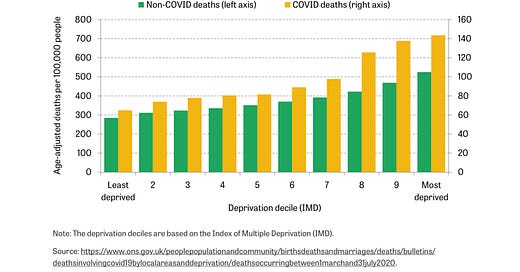Welcome to Just Two Things, which I plan to write daily, five days a week, if I can manage it. Some links may also appear on my blog from time to time. Links to the main articles are in cross-heads as well as the story.
#1: The socio-economic pandemic
The socio-economic effects of the pandemic are now pretty clear: they increase lots of types of existing inequality. The UK’s Institute of Fiscal Studies is pretty much as mainstream as it gets when it comes to UK economic analysis. These are their headline conclusions on what happened in the UK in 2020: I suspect that there are similar outcomes in other richer countries, depending on levels of social support. There’s also a short pdf report. In summary:
The COVID crisis has exacerbated inequalities between the high- and low-paid and between graduates and non-graduates.
The crisis has hit the self-employed and others in insecure and non-traditional forms of employment especially hard.
Educational inequalities will almost certainly have been exacerbated by the crisis.
Between March and July, mortality rates from COVID-19 were twice as high in the most deprived areas as in the least deprived.
The crisis has had very different impacts on different ethnic groups.
Through 2020, pensioners have on average reported becoming financially better off, whilst the young have borne the brunt of job and income loss.
The Bank of England research blog, Bank Underground, published last year a useful review of economic research about the effects of lockdown measures—some are surprising.
(H/t for the IFS report to Jonty Bloom)
The virtual world involves material production and factories somewhere. There’s a note on the Real World Economics Review blog about a riot at an Apple plant in India, owned by the Taiwanese company Wistron. More surprisingly, this was successful. One of the problems with the global tech sector is that the margins are high at the beginning (design) and at the end (distribution and services) of the value chain. No-one is smiling in the middle bit, where devices are actually made. So production gets out-sourced and managers have every incentive to squeeze their costs.
The small share of the final price accruing to offshored manufacturing in global value chains increases the pressure on vendors to keep wages down, maximize ‘productivity’ by lengthening the working day, and limit costs associated with ensuring better and safer working conditions….
[G]iven the nature of global value chains, the capacity of a developing country to serve as an export hub seems to be dependent on offering producers a field where labour costs could be kept at a minimum. Perhaps the official perception is that India is now more ‘capable’ of making that offer than China, where labour costs are seen as rising after long years of fast growth. However, the Wistron episode suggests that despite the current political strength of the ruling coalition, getting workers to accept a low wage and poor working conditions environment is not easy.
jft#009
If you are enjoying Just Two Things, do send it on to a friend or colleague.



